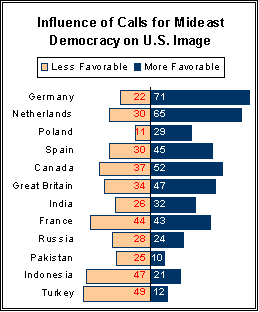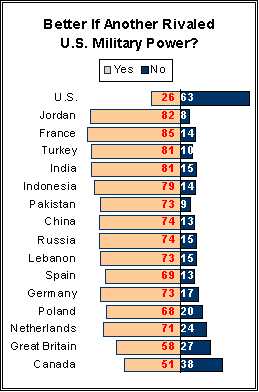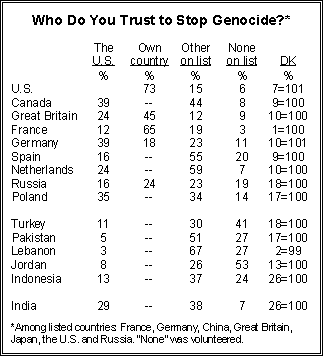 The January elections in Iraq did not cast the U.S. in a more favorable light in most of the countries surveyed. Only in the Netherlands and Germany do small majorities (55% and 50% respectively) say that the Iraq elections led them to have a more favorable opinion of the U.S. However, pluralities in Canada and Great Britain were also more inclined to view the U.S. favorably as a result.
The January elections in Iraq did not cast the U.S. in a more favorable light in most of the countries surveyed. Only in the Netherlands and Germany do small majorities (55% and 50% respectively) say that the Iraq elections led them to have a more favorable opinion of the U.S. However, pluralities in Canada and Great Britain were also more inclined to view the U.S. favorably as a result.
By contrast, in Poland, only 19% of the public says that the January elections improved their opinion of the U.S. In France, Spain, Turkey, India and Indonesia, pluralities say the elections left them with an even less favorable view of the United States as did half of those in Lebanon.
 But President Bush’s calls for democracy in the Middle East meet with a more favorable reaction in many countries. Large majorities in Germany (71%) and the Netherlands (65%) applaud the move, joined by a small majority in Canada (52%) as well as pluralities in Great Britain (47%), India (32%) and Spain (26%).
But President Bush’s calls for democracy in the Middle East meet with a more favorable reaction in many countries. Large majorities in Germany (71%) and the Netherlands (65%) applaud the move, joined by a small majority in Canada (52%) as well as pluralities in Great Britain (47%), India (32%) and Spain (26%).
However, the people of Poland are mostly unimpressed—a 40% plurality say that their views of the U.S. were unchanged by the calls. But only in France and in Muslim countries do pluralities say that the president’s Middle East democracy initiative had led them to a less favorable view of the U.S.
Transatlantic Tensions
 Americans and Europeans continue to take very different views of the transatlantic alliance. Majorities in every country of Western Europe say that it should take a more independent approach to security and diplomatic affairs than it has in the past. In Great Britain, France and Germany, these percentages, having risen sharply after 2002, have stabilized in the last year or two. However, in Spain the preference for looser ties to the U.S. declined significantly, from 60% in March 2003 to 50% now.
Americans and Europeans continue to take very different views of the transatlantic alliance. Majorities in every country of Western Europe say that it should take a more independent approach to security and diplomatic affairs than it has in the past. In Great Britain, France and Germany, these percentages, having risen sharply after 2002, have stabilized in the last year or two. However, in Spain the preference for looser ties to the U.S. declined significantly, from 60% in March 2003 to 50% now.
By contrast, Americans increasingly favor a close partnership with Western Europe. Two-thirds (66%) feel the U.S. and Western Europe should remain as close as in the past. That represents a substantial increase from 55% a year ago.
 There is an even bigger gap between Americans and other publics over whether the U.S. should remain the sole global military superpower, or if it would be better if a country or group of countries emerges as a rival to the U.S. Majorities in every other country surveyed, aside from the U.S., favor another country challenging America’s global military supremacy. Americans strongly reject this idea, by 63%-26%.
There is an even bigger gap between Americans and other publics over whether the U.S. should remain the sole global military superpower, or if it would be better if a country or group of countries emerges as a rival to the U.S. Majorities in every other country surveyed, aside from the U.S., favor another country challenging America’s global military supremacy. Americans strongly reject this idea, by 63%-26%.
In Western Europe, large majorities favor a countervailing military force with more than 69% of the publics in France, Germany, Spain and the Netherlands taking that view. Even most British and Canadians favor a rival for U.S. dominance to emerge, although somewhat fewer people in those countries endorse this idea.
In the former Soviet bloc, both Russia (74%) and Poland (68%) also heavily favor the rise of another military superpower. In Asia and the Middle East, support for a competing military power to the U.S. ranges upward from 74% in China, 73% in Pakistan and Lebanon and 79% in Indonesia, to more than 80% in India and Jordan.
U.S. Seen as a Threat
 Majorities in each of the predominantly Muslim countries surveyed express concern that U.S. military power may ultimately be turned against them. This is a dominant opinion even in Indonesia, where favorable views of the United States have increased over the last year.
Majorities in each of the predominantly Muslim countries surveyed express concern that U.S. military power may ultimately be turned against them. This is a dominant opinion even in Indonesia, where favorable views of the United States have increased over the last year.
A striking 80% of Indonesians say that they worry at least to some degree that America could someday become a military threat to their country, including 38% who say they are very worried. In Pakistan 71% express that concern, including 43% who say they are very worried. Majorities in Jordan (67%), Turkey (65%) and Lebanon (59%) also say that they fear a U.S. military threat at least somewhat. However, in Lebanon, that concern is concentrated among Muslims with 64% of Christians saying they are not much worried about the U.S. turning its military power on them.
Who Do You Trust?
 Despite strong reservations over America’s power, sizable minorities in many countries say they would most trust the United States to stop the killing if innocent people in another country were being slaughtered by an army, the police or another tribe.
Despite strong reservations over America’s power, sizable minorities in many countries say they would most trust the United States to stop the killing if innocent people in another country were being slaughtered by an army, the police or another tribe.
About four-in-ten Germans (39%) say they most trust the U.S. to stop the murder of innocent civilians, well more than the number who named Germany (18%) or another country. The same percentage of Canadians (39%) cited the U.S., although somewhat more (44%) said they trusted other countries to do something to stop genocide; Great Britain (21%) and France (15%) were the most frequently mentioned.
Just 12% of the French say they trust the U.S. most to take action to halt the killings of innocent civilians. A large majority in France (65%) say they mostly trust their own country to take action. A plurality in Great Britain (45%) also say they most trust their country, but nearly a quarter (24%) cite the U.S.
Few in the Muslim world, however, would rely on the U.S. to stop genocide. Only 13% of Indonesians, 8% of Jordanians and 5% of Pakistanis would turn to the United States. While in other Muslim countries no alternative country emerges as a likely source of assistance in such circumstances, in Lebanon a 42% plurality would look to France, and in Pakistan an equal plurality of the public, 42%, would turn to China.
U.S. Not Trusted on Environment
 When asked who they would most trust to protect the global environment, only small percentages in every country surveyed (other than the U.S.) pick the United States. Apart from self-selection (77% of Germans pick Germany, 45% of the French choose France, 43% of the British pick Great Britain and 33% of the Chinese pick China), there is no consensus on an alternative. Strikingly, just 12% of Russians say they would trust their own country to protect the environment.
When asked who they would most trust to protect the global environment, only small percentages in every country surveyed (other than the U.S.) pick the United States. Apart from self-selection (77% of Germans pick Germany, 45% of the French choose France, 43% of the British pick Great Britain and 33% of the Chinese pick China), there is no consensus on an alternative. Strikingly, just 12% of Russians say they would trust their own country to protect the environment.
However, nearly half (47%) of Pakistanis would turn to China for global environmental protection. In Lebanon, 41% put their trust in France while 25% of Indonesians look to Japan for environmental protection.


